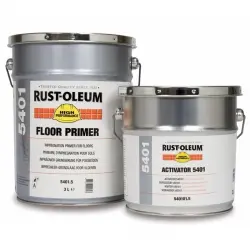- There are no more items in your cart
- Shipping Calculated at checkout
-
Sub-Total (inc. VAT)
£0.00
Need Help?
Impregnation Primers
Rawlins Paints' selection of high performance impregnation primers improve adhesion on porous and brittle floors, including concrete and other porous mineral surfaces, prior to overcoating with floor paints. Easy to apply, our impregnation primers include products with fast curing times, little to no odour, application to damp surfaces, and suitable for mechanical stresses.

PPG Nu-Klad Imp
2-component, solvent-free, impregnating epoxy floor primer. Primer for NU-KLAD floor coating systems Excellent impregnating properties (penetration and saturation of the concrete)

Remmers Epoxy ST 100
2-component epoxy system for priming and mortar applications, available in a transparent finish. Suitable for concrete, cement screeds, anhydrite screeds, magnesite screeds, and industrial floors. Excellent mechanical and chemical resistance with strong adhesion properties. Certified for fire resistance and slip resistance (R11 V4...

Remmers Epoxy FAS 100
2-component epoxy primer available in clear, for bonding on challenging surfaces. For tiles, various metals, concrete, and cement screeds, including slightly damp surfaces. Excellent adhesion, even on oily substrates, with high compressive and flexural strength. Can be used as a primer, bonding layer, levelling layer, or for producing...

Rust-Oleum 5401 Epoxy Impregnation Primer
Clear gloss three-component epoxy primer. For concrete, masonry, and other porous mineral surfaces. Solvent-free. Improves adhesion on porous and slightly damp surfaces. Excellent tensile and compressive strength. Professional use only.
Need Help?
Need Help?
Unleashing the Power of Impregnation Primers
What Makes Impregnation Primers Essential?
Impregnation primers are advanced formulations designed to penetrate deeply into porous substrates, such as concrete, stone, and brick. They work by bonding with the material at a molecular level, creating a stable and solid base for subsequent layers of coatings or finishes. This process significantly enhances adhesion, ensuring that any topcoat applied remains secure, even in harsh or high-traffic environments. By strengthening the substrate, impregnation primers act as a first line of defence, preventing premature coating failures.
Why Choose Impregnation Primers for Your Surface?
Surfaces like concrete and brick often suffer from porosity, which can lead to issues such as moisture absorption, surface degradation, or weak bonding with topcoats. Impregnation primers fill these voids, effectively sealing the surface and reducing the risk of common problems such as blistering, peeling, or flaking. They are especially beneficial for environments exposed to high levels of moisture, temperature fluctuations, or mechanical stress, providing a durable, long-lasting foundation that supports the overall lifespan of the surface treatment.
Where Can Impregnation Primers Be Used and Why?
Impregnation primers are ideal for use on a wide variety of porous surfaces, particularly in industrial, commercial, and residential settings. They are often employed in areas where surfaces are subject to heavy foot traffic, mechanical wear, or environmental exposure, such as warehouses, factories, and outdoor walkways. These primers stabilise the substrate, providing a robust base that ensures the integrity of any topcoat applied. By preventing water penetration, they also protect against freeze-thaw damage, making them essential for external applications.
FAQs About Impregnation Primers
Can impregnation primers be used on both new and old surfaces?
Yes, impregnation primers are suitable for both newly installed and aged surfaces. On older surfaces, they help to restore strength and stability, while on new surfaces, they prepare the substrate for optimal coating performance.
What types of coatings can be applied over impregnation primers?
Impregnation primers work with a range of topcoats, including epoxy, polyurethane, and acrylic coatings. Always consult with the technical team to ensure product compatibility.
How do impregnation primers perform in areas with high chemical exposure?
Impregnation primers offer excellent resistance to chemical attack, particularly in industrial environments where exposure to aggressive substances is common. They provide an additional layer of protection, ensuring the surface remains intact.
